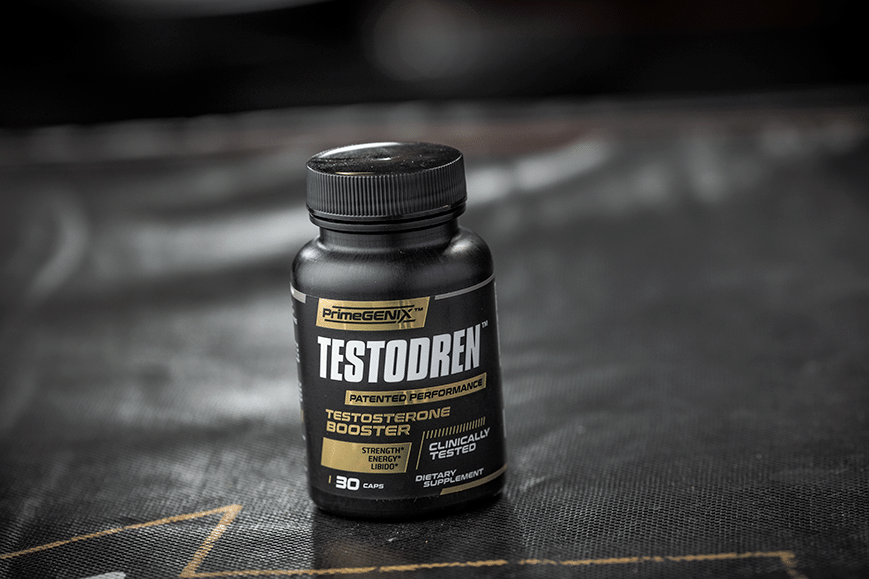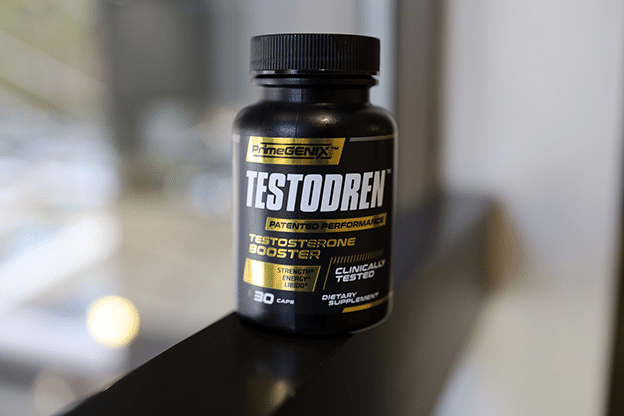The warmer weather of summer can be both a blessing and a curse for men. It may come as a shock to some, but male testosterone levels take a huge hit in the summer months. There is research that shows exactly what happens to our T-levels during the summer, but for now, let’s stick with some ways you can address this phenomenon.1
The good news about summer approaching is that it provides a great excuse to get outside, move your body, and soak up the sun. Not only are these things good for your health, but they can also help boost your testosterone.
We’ve put together a few tips and recommendations to get the most out of your T-boosting efforts this summer. We’ll start with understanding the importance of testosterone for your overall health and well-being before discussing what the normal range is for testosterone.
Why Is Testosterone So Important?
Both men and women naturally produce the testosterone hormone, though the levels are much higher in men. This important hormone is responsible for much of what makes a man a man. For men, aging means that our testosterone production decreases, contributing to low-T. While this decline is normal for all of us, significant drops can have detrimental effects on our health.
Our testosterone levels affect everything from our sex drive to our fertility to our hair growth and bone density. It may even come as a surprise that our energy levels, aggression, and other behavioral factors (irritability, lack of motivation, etc.) can also be influenced by our T-levels.
Even if your T-levels decline slowly, instead of suddenly and significantly, you may notice changes. In these cases, men who are athletes or bodybuilders look for ways to maintain or increase their testosterone production.
That doesn’t mean that unless you are a professional athlete, you shouldn’t worry about your low-T. Quite the contrary. If you aren’t someone who spends a lot of time assessing their physique, it may take you longer to notice you’re experiencing symptoms.
Recognizing the signs of low testosterone is the first step to making a change and living a healthier life. Let’s take a look at some symptoms you can look out for in the next section.

What Are the Symptoms of Low Testosterone?
The greatest focus when discussing testosterone levels is on the effects of low-T. Testosterone levels that are too high, however, can also negatively impact your health.
Men with low or high testosterone levels are more at risk for heart attacks and stroke. Research is still being conducted around the connection between testosterone and heart health, but early results show that low-T can have a serious impact on your cardiovascular health. T-levels in the normal range levels are cardio-protective, which means they can help guard your heart against potential damage.
Other symptoms that may indicate low testosterone are:
- Low sex drive
- Fatigue
- Depression
- Erectile dysfunction
- Irritability
- Reduced muscle strength
- Problems concentrating
- Infertility
- Increase in body fat/weight gain
- Loss of body hair
- Breast growth
- Anemia (a lack of healthy red blood cells)
- Bone thinning (osteoporosis)
Experiencing one or more of these symptoms does not guarantee you have low testosterone. If you are suffering from any of these symptoms, however, you should consult with your doctor, as it may indicate you have hypogonadism (low testosterone).
Are Your Testosterone Levels in the Normal Range?
Research has found that testosterone levels in males are low until around age 11 and begin rising until it peaks in their 30s when it starts to decline. After age 30, testosterone production decreases about 1% each year.
When you are unsure if you’re suffering from low testosterone, the first step is to have your hormone levels checked. Mood changes due to warmer weather happen to a lot of men, but only a blood test will tell you if the root cause is a hormone imbalance.
The results of your testosterone level test are dependent on the following factors:
- Weight
- Time of day blood sample is taken
- Age
- Medications or steroids
- Genes
- Other health conditions or diseases
Normal testosterone levels fall between 300-1,000 nanograms per deciliter of blood (ng/dL). Although “normal” T-levels based on age ranges haven’t been studied, 300 ng/dL is the universally accepted threshold for low-T. It’s also generally agreed upon that younger men have a higher “normal” testosterone than older men.
Where you fall within the range will be determined by things you can control and some things you cannot. Living a healthy lifestyle may contribute to keeping your hormone levels balanced, and that is something you can manage.
Check out these three simple ways to take charge of your testosterone levels this season.

#1 Incorporate More of These Foods Into Your Diet
Addressing your nutrition is a great way to improve your testosterone levels. Our hormones are affected greatly by what we consume, so increasing your “pro-testosterone” producing foods is a good place to start.
Monounsaturated Fats
Staying away from fats entirely may not be what’s right for everyone. This is especially true if you have low-T levels. Research has found that consuming a healthy amount of monounsaturated fats can encourage improvements in testosterone levels for men. Healthy sources of monounsaturated fats are almonds, avocados, olive oil, peanuts, and peanut butter.
Broccoli and Other Vegetables
Consuming the right kinds of veggies can cause a release of Diindolylmethane (DIM), which helps regulate the production of testosterone. To be more specific, broccoli, cauliflower, and brussel sprouts can all have a positive impact on our testosterone as we age.
Another benefit of eating these particular vegetables is that they can help prevent the production of estrogen, prevent prostate cancer, or slow the progression of other cancer cells.
Carbohydrates
Studies have shown that men who incorporate a little more carbohydrates in their diet have a slightly higher concentration of testosterone. If you’re working out regularly, you’ll need more carbs to increase your energy levels, anyway.
Eating more carbs without regular physical exercise will make it difficult to keep off unwanted pounds. You’ll also have a difficult time maintaining the testosterone boost that comes from consuming carbs.
Fenugreek
Fenugreek is an herb that has been researched and proven to have positive effects on testosterone production in some men. Extract from the fenugreek seed is included in many natural supplements but you can also add it to wraps, stews, and other foods after being dried.
Avocados
Avocados are high in zinc, which has been proven in multiple studies to help improve testosterone production, sperm quality, and fertility. They are also rich in vitamin E, magnesium, and boron, which studies have shown may benefit your testosterone levels.
Nuts
Most nuts have a positive impact on testosterone levels. They have omega-3 fatty acids that deliver high-quality nutrients to your body. Anything from peanuts to Brazil nuts can benefit your testosterone, but macadamia nuts have a more beneficial effect. Macadamia nuts contain saturated fatty acids that are very helpful in the production of testosterone.
Ginger
Although there isn’t as much scientific evidence to support ginger’s impact on testosterone levels, some research on male animals has been promising. Researchers found that when giving ginger to male animals, testosterone rises. This may be due to increased antioxidants and HDL cholesterol.
Ginger also helps circulate testosterone throughout your body and manage your blood sugar. It’s a versatile ingredient and can be added to many different foods and smoothies.
Strawberries
Due to the amount of zinc in strawberries, they are one of the best foods you can consume to increase your testosterone. As we’ve already mentioned, zinc deficiency is directly linked with low testosterone. Strawberries provide your body with fiber, vitamin C, and antioxidants, without adding sodium or extra calories.

#2 Shake Up Your Workouts
We can’t emphasize enough how crucial physical activity and weight training are to increasing testosterone levels. Rather than pushing your body to its maximum limit, science suggests doing no more than 90% of your limit.
Incorporate Resistance Training
Resistance training uses resistance bands instead of conventional weights to build up strong and lean muscle mass. When you work your muscles beyond their normal limits, you create microtears in the muscle tissue that need repair. The recovery process allows your muscles to grow with each workout.
Resistance training promotes higher testosterone levels and is good for your cardiovascular health. Some men have reported that incorporating resistance training into their routine has improved their sexual performance and experience.
Try High-Intensity Interval Training
High-intensity interval training (HIIT) is a workout that balances the short burst of high-intensity workouts with small breaks. The secret to this workout is to force your body to burn more calories in a shorter time. During a HIIT workout, your body enters an anaerobic state that burns through more sugar and glucose.
The benefit of adding HIIT into your workout regimen is that you can pair it with any exercise. Going for a jog? With HIIT, you could sprint for 60 seconds and then walk for 60 seconds and maximize your results.
Add Compound Lifts to Weight Training
Compound lifts are beneficial to weight training when your goal is to boost testosterone. Using a weight machine instead, you may not get as much as you’d like to out of weight training.
The idea is to engage as many muscles on either side of the joints simultaneously, which is why they are sometimes called multi-joint lifts. You may already be including many of these lifts during your workout. Deadlifts, squats, and the inclined bench press are just a few common ones you may know.
Stuck on deciding what exercises you should be doing to best improve your health this year? Read our post on the, “5 Easy Daily Exercises To Improve Your Health in 2022” to be in the best shape this year.
Have More Sex
We know it may seem counterproductive to suggest increasing your sexual activity to boost your T-levels. Especially if you’re already suffering from low libido as a result of your low-T. This tip is for the guys who may be experiencing symptoms of testosterone deficiency other than erectile issues.
Regularly engaging in sexual intercourse can increase testosterone in your body, at least for the short term. Because of the amount of aerobic exercise involved, testosterone production increases similarly to when you complete an intense workout. Your levels will likely return to your pre-sexual activity, but you’ll gain a temporary boost and have some fun at the same time.

#3 Take a T-Booster
Testosterone boosters (T-boosters) include natural supplements and other more serious medical interventions like testosterone replacement therapy or steroids. For this article, we’ll focus on natural testosterone-boosting supplements, since it’s the only way to naturally raise your T-levels.
Natural T-boosters can significantly improve your mood and athletic performance, without the risk of adverse side effects. While they may not be strong enough to correct severe testosterone deficiency, testosterone boosters may help improve your mood, libido, and muscle mass.
If your testosterone issues are mild, starting with a natural supplement like Testodren by PrimeGENIX can make a world of difference. It’s an all-natural testosterone booster designed to encourage testosterone production. The formula has been clinically proven and contains ingredients that have been scientifically studied for their efficacy.
Natural supplements are not regulated by the Food and Drug Administration (FDA). The best ones, however, are produced in cGMP-certified facilities that follow strict production regulations monitored by the FDA.

Testosterone Boosters: Which Supplements Are Effective?
Natural supplements are a big business – just look at the selection at any health food store. The overwhelming selection may discourage some, but there are ways you can separate the high-quality, effective products from the duds.
A few things to look for when researching a new testosterone booster are:
- Quality and dosage of ingredients – transparency of ingredients
- Clinically proven formula – scientific research that backs up claims
- Trustworthiness of brand – positive user reviews and testimonials
- Formulated in a cGMP-compliant facility – supports safety and efficacy of the product
- Free of adverse effects – no reported harmful side effects
- Money-back guarantee – shows confidence in the product
You’ll want to avoid supplements with unspecified ingredients, no specific scientific evidence to support claims, negative reviews, or indefensibly high price tags. Cost alone should not be a deterrent, but you should think twice about a product that has a high asking price with no evidence to support its effectiveness.
Testodren meets all the above criteria for a high-quality and highly effective natural testosterone booster. If you have low or declining testosterone levels, try Testodren to experience a boost to your T-levels and your overall health.




